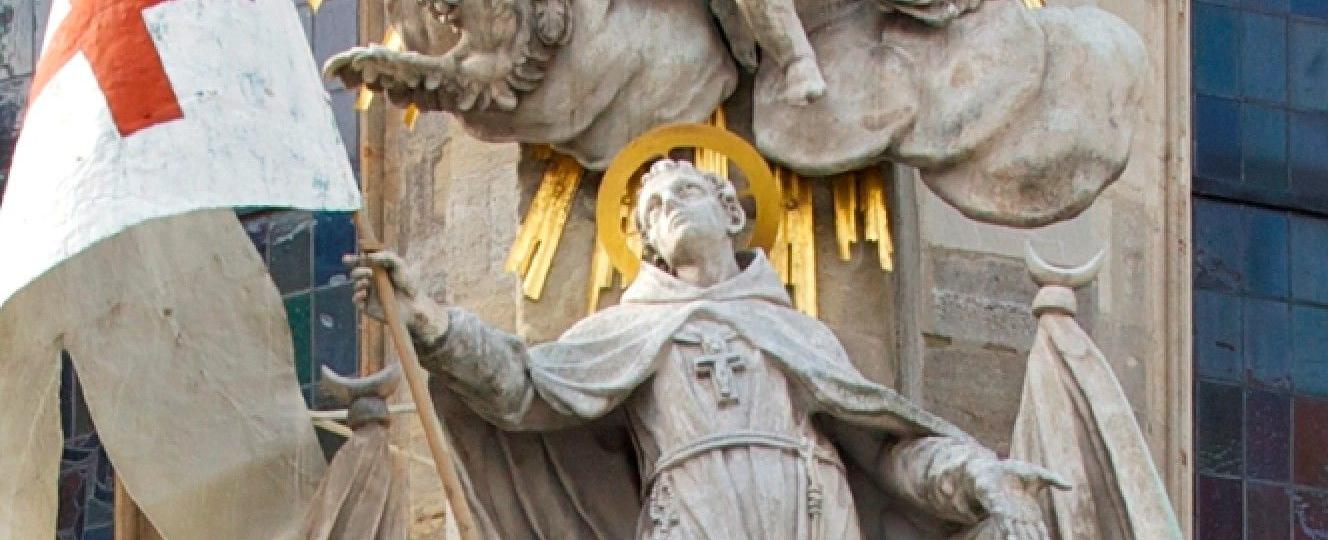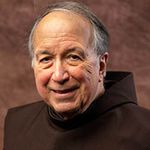John of Capestrano

On October 23, the Church remembers St. John Capistran, a Franciscan who had a prominent and multi-faceted ministry as a preacher and reformer in 15th century Europe.
Several years ago, Fr. Steve Grunow accurately described him: “John was a Franciscan friar and priest, but not of the good-natured variety of Franciscans that holds the popular imagination. To describe John as zealous would be an understatement. He walked the fine line between zeal and fanaticism, allowing God to write straight with the crooked lines he drew throughout his life.”
Born in 1386 in Capestrano in the Abruzzo region of Italy, his youth was scarred by violence. His father, a knight, and all his brothers were killed in one of the bloody civil conflicts so common in Italy at the time. He later spoke of the thirst for revenge that he felt as a young man. He studied law at the University of Perugia and soon entered politics and became a legal counselor at the royal court in Naples. In 1413 he returned to Perugia and was named a judge in that city, gaining a reputation as a severe but honest magistrate. The next year, still not 30, he was named governor and in 1415 was married to a wealthy young woman from Capestrano.
However, John’s life took a dramatic turn later that year. While outside Perugia he was captured by opposing forces and imprisoned. He was treated horribly, but managed to buy his ransom. This prison stay caused him to re-evaluate his life; he dramatically renounced his career and marriage (which had never been consummated) to join the new Observant Reform of the Friars Minor on October 4, 1415.
John’s legal background and activist temperament continued to mark his life and ministry as a Franciscan. Like his friend Bernardine of Siena, he became a celebrated popular preacher, but his legal background meant that he quickly became prominent on a practical level in promoting the cause of the Observant reform, drawing up reform statutes under Pope Martin V. He was also employed by the Papacy as an inquisitor, preaching against heretical movements in Italy and in Central Europe. In both of these tasks, as Fr. Grunow says: “He brokered no compromise and had no patience for opposition.”
John was what we would call today a “workaholic.” He needed only 3-4 hours of sleep a night and spent much time, in the midst of all his preaching activities, to leave behind a considerable body of written works. He also served as a mediator in a number of conflicts.
When he was old and frail, the Pope commissioned John to preach a Crusade against the Ottoman Turks who had been emboldened by the capture of Constantinople in 1453 and began threatening Hungary and the Balkans. He joined up with the Hungarian general John Hunyadi, and personally led forces to relieve the siege of Belgrade in 1456. Shortly afterwards, John fell victim to the plague and died. He was canonized in 1690; in 1984 Pope John Paul II named him the patron of military chaplains.
The header image is from a heroic statue of John outside St. Stephen’s Cathedral in Vienna.
“Now a light does not shine for itself, but it spreads its rays and shines upon everything that comes into its view. So it is with the glowing lives of upright and holy clerics…they must bring light to all who see them.” (from the treatise, “Mirror of the Clergy”)
Dominic Monti, OFM
Professor of Franciscan Research in the Franciscan Institute of St. Bonaventure University
Dominic V. Monti, OFM, is a Franciscan Friar of Holy Name Province (USA) and currently professor of Franciscan Research in the Franciscan Institute of St. Bonaventure University. He devoted the greater part of his ministry to teaching the History of Christianity, in particular the history of the Franciscan movement. He has contributed two volumes to the Works of St. Bonaventure series and is author of Francis & His Brothers, a popular history of the Friars Minor.

